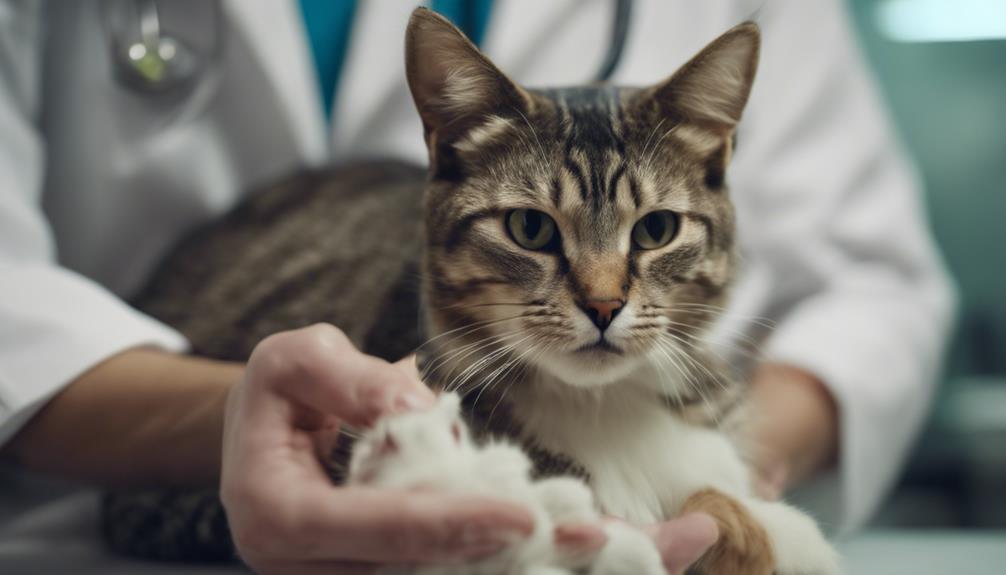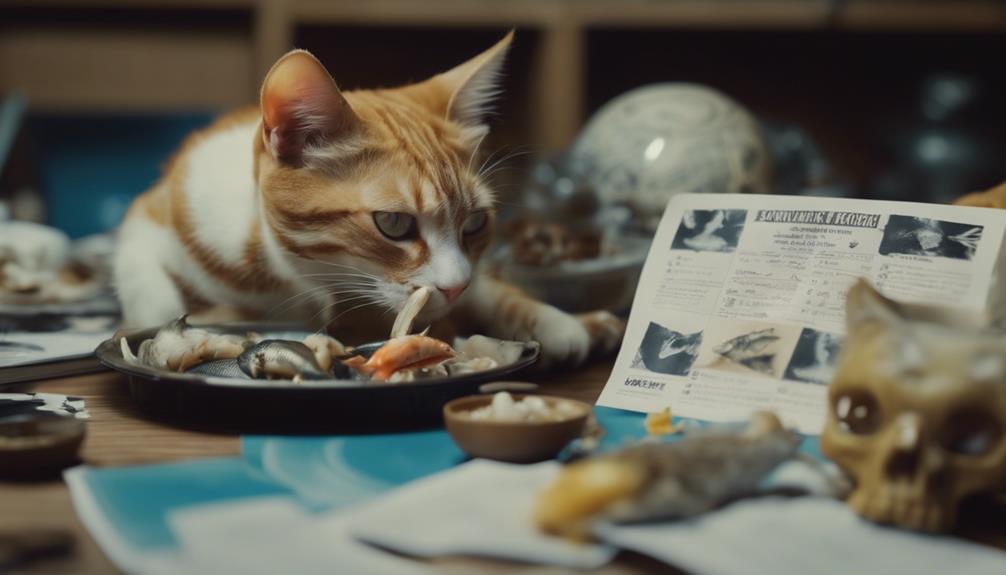As feline owners, it's essential to consider the potential risks associated with mercury poisoning in cats, particularly concerning their diet. The prevalence of mercury in certain fish species poses a significant threat to our beloved companions, necessitating caution and informed decision-making when it comes to feeding practices.
By understanding the nuances of mercury toxicity and implementing safe feeding strategies, we can protect our feline friends from this insidious danger. Stay tuned as we explore practical tips and expert advice on how to navigate the complexities of feline nutrition and ensure the well-being of our cherished pets.
Key Takeaways
- Limit fish intake in cats to prevent mercury poisoning.
- Use cat-specific omega-3 supplements under vet guidance.
- Recognize signs of mercury poisoning like ataxia and tremors.
- Activated charcoal can help prevent absorption of mercury in cats.
Mercury Poisoning in Cats: Key Facts
Mercury poisoning in cats presents a serious health concern, particularly when felines ingest fish containing elevated levels of mercury. Large fish, such as tuna, can accumulate high levels of mercury, posing a risk to cats that consume them regularly.
The signs of mercury poisoning in cats include ataxia, tremors, vision loss, abnormal behavior, and central nervous system depression. Treatment for mercury poisoning in cats may be limited, with potential irreversible neurological and kidney damage.
Prevention is crucial, involving measures such as limiting fish intake and keeping hazardous products containing mercury away from cats. Activated charcoal can aid in preventing absorption of inorganic mercury.
Signs and Symptoms of Mercury Poisoning
When cats are affected by mercury poisoning, they may exhibit a range of noticeable signs and symptoms that indicate potential harm to their health. These signs can include:
- Ataxia (loss of coordination)
- Tremors
- Vision loss
- Abnormal behavior such as increased aggression or fearfulness
- Central nervous system (CNS) depression
Cats may also experience:
- Weakness
- Muscle wasting
- Difficulty breathing
It is crucial for cat owners to be vigilant and watch for these indicators, especially if their feline companions have a diet high in fish, particularly large fish like tuna that can accumulate mercury. Recognizing these symptoms early can help in seeking prompt veterinary care to address any potential mercury poisoning issues.
Treatment Options for Mercury Poisoning

What are the effective treatment options available for addressing mercury poisoning in cats?
Treatment for mercury poisoning in cats can be challenging, with limited options available. If ingestion is recent, inducing vomiting or using activated charcoal to prevent absorption of inorganic mercury may be considered. However, once symptoms appear, such as ataxia and tremors, the damage may already be irreversible, affecting the central nervous system and kidneys. Seeking immediate veterinary care is crucial.
To prevent mercury poisoning, limiting fish intake and keeping hazardous products away from cats is essential. Remember, prevention is key when it comes to mercury poisoning in felines due to their sensitivity to this toxic substance.
Safe Feeding Practices for Cats
Effective cat care involves implementing safe feeding practices that prioritize the well-being and health of feline companions. When feeding your cat seafood, it's crucial to do so in moderation. Small amounts of seafood can be given as treats, while cooked salmon skin or tuna should be fed sparingly.
Consider using cat-specific omega-3 supplements and fish oils that have been tested for safety. Before introducing any new supplements into your cat's diet, consult a vet for guidance. It's important to ensure that omega-3 sources are free from dangerous compounds that could harm your cat.
Importance of Consulting a Veterinarian

Seeking guidance from a qualified veterinarian is essential in ensuring the optimal health and well-being of your feline companion. Veterinarians possess the expertise to offer personalized advice on your cat's specific dietary needs, including safe ways to incorporate omega-3 fatty acids into their meals.
When it comes to preventing mercury poisoning in cats, consulting a vet is crucial as they can recommend suitable feeding practices to minimize the risk of toxicity. Vets can provide valuable insights on the types and amounts of fish that are safe for your cat to consume, helping you navigate the potential dangers associated with mercury ingestion.
Preventing Mercury Poisoning in Cats
To safeguard your cat from the dangers of mercury poisoning, understanding and implementing preventive measures in their diet is paramount. One way to prevent mercury poisoning in cats is by being mindful of the types and amounts of fish they consume. Below is a table outlining fish types and their mercury levels to guide you in making safer choices for your feline friend:
| Fish Type | Mercury Level |
|---|---|
| Salmon | Low |
| Cod | Low |
| Tuna | High |
Additional Resources for Cat Owners

Cat owners can benefit from accessing a variety of additional resources to enhance their knowledge and care for their feline companions. Here are three valuable resources for cat owners to explore:
- Online Communities: Joining online forums or social media groups dedicated to cat health and nutrition can provide a supportive community where you can seek advice, share experiences, and learn from other cat owners facing similar challenges.
- Veterinary Websites: Websites like the American Association of Feline Practitioners (AAFP) or the American Veterinary Medical Association (AVMA) offer reliable information on cat care, including articles, guidelines, and resources recommended by veterinary professionals.
- Cat Care Books: Investing in reputable cat care books written by experts in feline health and nutrition can provide in-depth knowledge and practical tips to help you better understand and care for your cat.
Frequently Asked Questions
Can Mercury Poisoning in Cats Be Passed on to Humans if They Consume the Same Contaminated Fish?
Mercury poisoning in cats through contaminated fish consumption does not directly pass to humans. However, shared consumption of mercury-contaminated fish poses risks to both species. Human exposure to high levels of mercury can result in serious health issues.
Are There Any Specific Types of Fish That Are Safer for Cats to Consume in Terms of Mercury Levels?
Certain fish like haddock, flounder, and pollock generally have lower mercury levels, making them safer options for cats. Consult a veterinarian to ensure a balanced diet and limit potential risks associated with mercury poisoning.
How Long Does It Typically Take for Symptoms of Mercury Poisoning to Appear in Cats After Ingestion?
Symptoms of mercury poisoning in cats may appear within days to weeks after ingestion. Early signs include ataxia, tremors, vision loss, abnormal behavior, and CNS depression. Prompt veterinary care is crucial for diagnosis and treatment.
Are There Any Alternative Sources of Omega-3 Fatty Acids That Are Safe for Cats and Do Not Pose a Risk of Mercury Poisoning?
Safe sources of omega-3 fatty acids for cats include algae-based supplements. These alternatives are free from mercury contamination, providing a safe way to incorporate essential nutrients into your feline's diet without the risk of mercury poisoning.
Is There a Specific Test That Can Confirm Mercury Poisoning in Cats, and How Is It Conducted?
Confirming mercury poisoning in cats involves blood and urine tests to measure mercury levels. These tests help diagnose toxicity. Consult a veterinarian promptly if poisoning is suspected. Early detection is crucial for managing mercury poisoning and protecting your feline companion's health.
Conclusion
In conclusion, understanding the risks of mercury poisoning in cats is essential for responsible pet ownership.
By recognizing the sources, symptoms, and implications of mercury toxicity, cat owners can take proactive steps to safeguard their feline companions.
Implementing safe feeding practices, consulting with a veterinarian, and being vigilant in prevention efforts are key in ensuring the well-being and longevity of our beloved cats.
Stay informed and proactive in protecting your feline friends from the dangers of mercury poisoning.




